In the evolving landscape of Indian business, Environmental, Social and Governance (ESG) metrics have become pivotal in determining a company's sustainability and ethical impact. For Micro, Small and Medium Enterprises (MSMEs), integrating solar energy solutions presents a tangible avenue to enhance ESG performance.
Understanding ESG and its relevance to MSMEs
ESG encompasses three critical dimensions -
Environmental - Focuses on a company's impact on the planet, including energy consumption, waste management and carbon footprint.
Social - Pertains to relationships with employees, suppliers, customers and communities, addressing issues like labour practices and community engagement.
Governance - Relates to internal systems, controls and procedures, ensuring transparency, ethics and compliance.
For MSMEs, ESG considerations are not merely about compliance but are increasingly linked to access to capital, market competitiveness and long-term viability. Investors and large corporations are prioritising ESG-compliant partners, making it imperative for MSMEs to align with these standards.
The environmental advantage of solar energy
Adopting solar energy directly addresses the environmental component of ESG. By transitioning to renewable energy sources, MSMEs can significantly reduce their carbon emissions and reliance on fossil fuels.
According to the Ministry of New and Renewable Energy, as of May 2025, India's installed solar capacity reached 110.83 GW, with rooftop solar installations contributing a substantial share. MSMEs, especially in energy-intensive sectors, stand to benefit from this shift.
A report by the Economic Times highlighted that by 2024, 21% of Indian MSMEs were powered by solar energy, leading to an average reduction of 30% in power bills and a decrease in CO₂ emissions by 110 million tonnes annually.
Social implications - Empowering communities and employees
Beyond environmental benefits, solar energy adoption has profound social implications.
Job creation - The solar sector has generated employment opportunities in manufacturing, installation and maintenance.
Community development - MSMEs investing in solar can contribute to local development, especially in rural areas, by providing stable energy sources and supporting local economies.
Employee well-being - Reliable energy ensures uninterrupted operations, leading to better working conditions and job security.
Organisations like the SELCO Foundation have demonstrated the transformative impact of solar energy on underserved communities, enhancing livelihoods and promoting sustainable development.
Governance - Enhancing transparency and accountability
Integrating solar energy can bolster the governance aspect of ESG by:
Demonstrating commitment - Investing in renewable energy showcases a company's dedication to ethical practices and long-term sustainability.
Attracting investors - ESG-compliant businesses are more appealing to investors seeking responsible and forward-thinking ventures.
Regulatory compliance - Aligning with national and international sustainability goals ensures adherence to evolving regulations.
The Securities and Exchange Board of India (SEBI) has mandated Business Responsibility and Sustainability Reporting (BRSR) for the top 1,000 listed companies, emphasising the importance of ESG metrics in corporate governance.
Financial incentives and support for MSMEs
Recognising the potential of solar energy in driving sustainable growth, the Indian government has introduced several initiatives to support MSMEs.
Grid-connected Rooftop Solar Programme - Provides financial assistance for rooftop solar installations.
MSME Sustainable (ZED) Certification - Encourages MSMEs to adopt sustainable practices, offering incentives and recognition.
Technology and Quality Upgradation (TEQUP) scheme - Supports MSMEs in adopting energy-efficient technologies.
These programmes not only reduce the financial burden of transitioning to solar energy but also enhance the overall competitiveness of MSMEs.
Overcoming challenges in solar adoption
While the benefits are clear, MSMEs may face challenges in adopting solar energy.
Initial investment - High upfront costs can be a deterrent, though long-term savings often offset these expenses.
Technical expertise - Lack of knowledge about solar technologies may hinder implementation.
Space constraints - Limited rooftop space can restrict the scale of installations.
To address these issues, partnerships with specialised solar companies, government support and awareness programmes are essential.
Conclusion - A strategic move towards sustainability
For Indian MSMEs, embracing solar energy is more than an environmental initiative; it's a strategic decision that enhances ESG performance, reduces operational costs and positions businesses for long-term success. By leveraging government support, technological advancements and collaborative models, MSMEs can lead the way in India's sustainable development journey.




 +91 7208055523
+91 7208055523
 Help & support
Help & support
